When springtime comes and mosquitoes start biting, controlling the pest population in your home can seem impossible. Luckily for you, adding some fragrant herbs and flowers to your indoor spaces can help repel mosquitoes and other insects like flies.
What are the best indoor mosquito repellent plants? There are a variety of plants you can use to keep mosquitoes out of your house. Some good options include mosquito plants, lemongrass, citronella, marigolds, rosemary, thyme, lavender, basil, mint, and catnip, which will repel these pesky insects without the need for harmful chemicals.
Let’s talk about how you can use these plants to repel insects. This article will be discussing how effective they are at warding off pesky pests so that you won’t have to worry about mosquitoes in your home again.
Are Some Indoor Plants Able To Repel Mosquitos, Flies, and Other Pests?
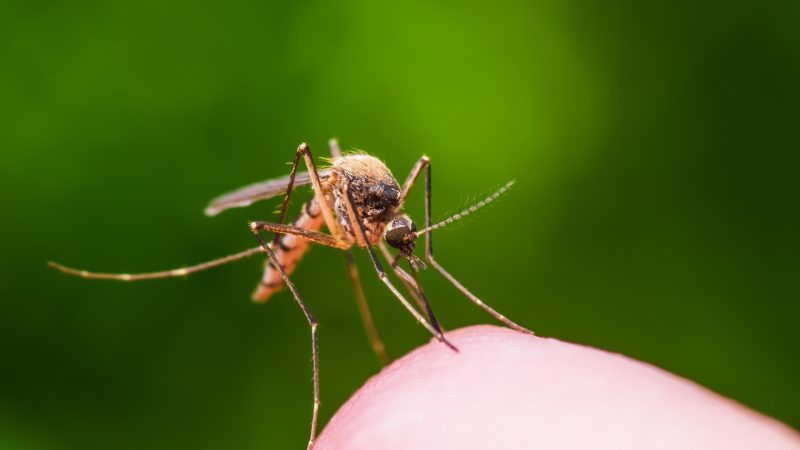
Some indoor plants can repel mosquitos, flies, and other pests, including lemongrass, citronella, and rosemary. If used properly, they can repel mosquitoes, fleas, and other pests from your home.
Mosquitoes rely on their sense of smell to detect humans. When they smell carbon dioxide released from human breathing, they follow it upwind to find a host.
When you use fragrant plants like citronella, lemongrass, and others, mosquitoes smell the oils in the plant and fly away since the smell is far too intense for them.
Still, just planting the fragrant herbs and keeping them in your home will not do the trick if you want to keep these pesky insects at bay. You have to release the oils from the plant for them to be effective.
So, what repels mosquitoes is the smell of the oil inside the plant. If you want to repel insects indoors with these plants, you may need to crush some of their leaves and leave them by your doors or window sills.
You may also want to soak the leaves of mosquito-repellent plants in ethanol or high-proof vodka to make a natural bug spray, or you can burn them like incense. You can also rub the leaves directly on your skin to keep insects away.
This smell tactic is also excellent at repelling many insects such as fleas, flies, slugs, beetles, rodents, and more. Still, these mosquito-repelling plants will attract pollinators like bees and butterflies.
Do Some Indoor Plants Cause Or Attract Mosquitoes?
Some indoor plants will cause or attract mosquitoes. Mosquitoes lay their eggs in still water, and their larvae feed on pollen. So, plants that require marshy, wet conditions may invite mosquitoes to lay their eggs in the pools of water that accumulate in your plants’ pots.
Young mosquito pupae also feed on flowers, so adults may lay their eggs in flower pots to offer their young food when they grow.
If you want to keep mosquitoes from laying eggs in your home, only plant indoor plants that do not require water logging to grow. You may also want to avoid planting flowers indoors or only plant indoor flowers if there is no water near the pot.
9 Beautiful Indoor Plants That Repel Mosquitoes and Flies
Here are ten beautiful decorative indoor plants that will make your house more attractive and drive away mosquitoes. These plants are easy to find in garden shops and greenhouses, inexpensive, and hardy.
Keep them properly watered, give them a big pot of dirt, and provide them with the right amount of light, and these all-natural bug deterrents will be driving mosquitoes and fleas from your door for years to come.
1. Mosquito Plant
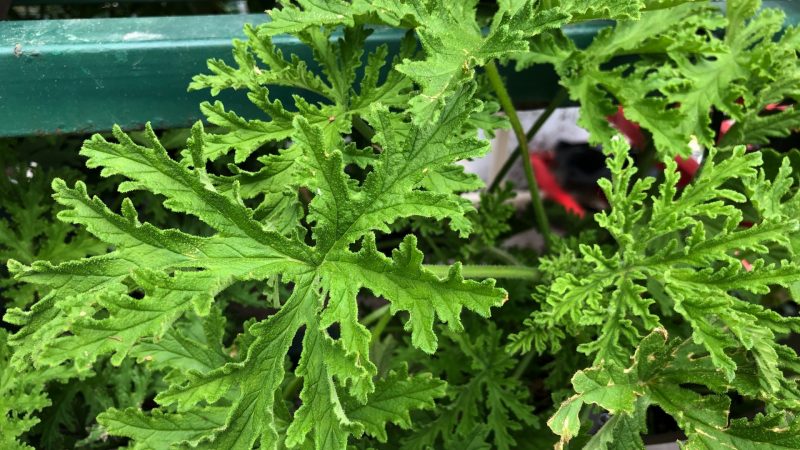
Mosquito plants, also known as citronella plants, were bred using Chinese Citronella Grass and African Geraniums. The result is a potent mosquito repellent that can be rubbed on the skin or sprayed in an area to deter mosquitoes from landing – they are so effective because they use both scent and chemical irritants such as geraniol (2-hydroxyethyl cymene) to ward off hungry mosquitos.
So, when using a citronella plant to repel mosquitoes, you should soak the leaves in ethanol or olive oil to make a bug spray or oil concentrate for the best results. On the other hand, mosquitoes/Citronella plants also kill larvae when topically applied.
Using the mosquito plant in lieu of harsher bug repellants not only keeps your skin safe but is also a great option for those who love gardening. The oil from its leaves contains 30% to 40% DEET and can be applied directly onto clothing or used as a topical lotion like any other chemical-based insect repellant out there; however, this one’s natural.
Mosquito plants prefer either full sun or partial shade depending on how much water they need — their size will depend largely on what kind of pot you use because they typically do not grow taller than 3 to 4 feet (0.9 to 1.2 m) tall.
According to the results of an extensive study released recently, using a diffuser indoors is 68% effective at repelling mosquitoes in comparison with 14% for those who used only citronella candle lights.
2. Lemongrass
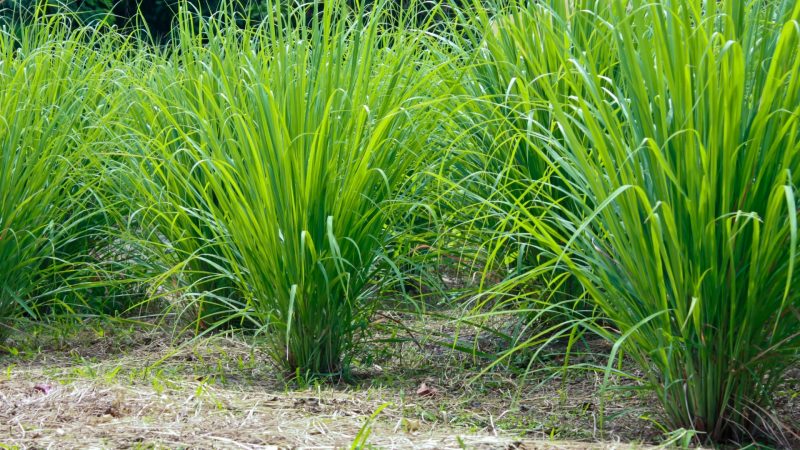
Lemongrass is well-known as a sweet-smelling seasoning in many cuisines. Still, its powerful scent is also an excellent mosquito repellent. Lemongrass is so effective that its extract can be used to kill mosquitoes on the spot.
Lemongrass is sensitive to cold, which makes it a great indoor container plant. It does need full sun to grow, so always keep it near a bright window.
3. Marigolds
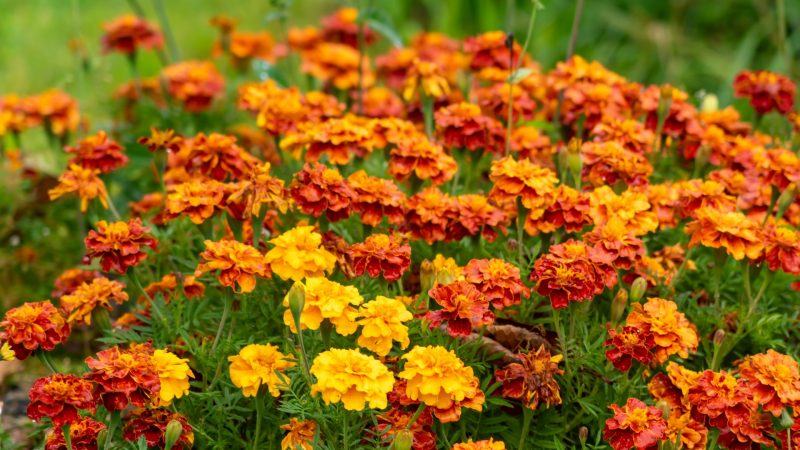
Many professional farmers and casual gardeners plant marigolds around their vegetables to ward off and kill harmful insects. They are also effective at killing mosquito larvae and pupae.
That’s because marigolds contain pyrethrum, which is an insecticide used to kill hundreds of different insects, including beetles, ants, mites, fleas, ticks, and flies.
Their bright flowers draw in mosquito pupae, which eat the nectar and promptly die. Place these brilliant flowers near windows and in bug-dense spots to keep mosquitoes away and kill them off.
4. Rosemary
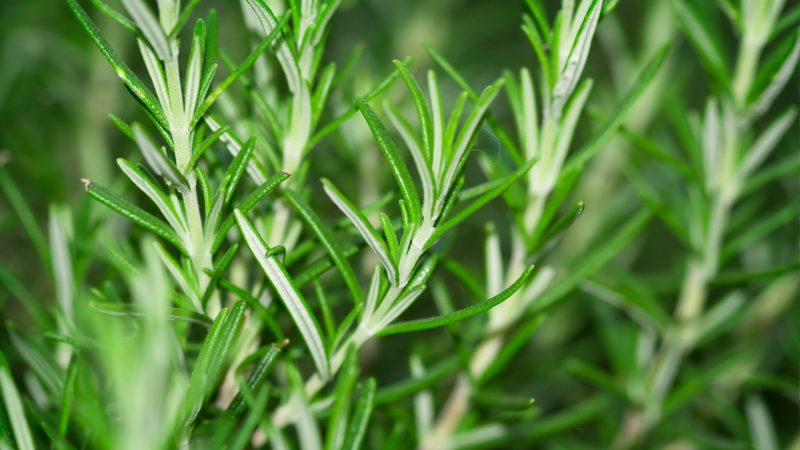
Rosemary also has a pungent smell that insects hate. As a bonus, it is lovely to use in cooking, and it is a hardy plant that does not require much water or sun to stay alive.
Rosemary is one of the best herbs to use directly on your skin to repel mosquitoes. It has such a pleasant scent and a very oily composition. You can also rub the crushed leaves on your window sills to deter mosquitoes from coming into your home.
Rosemary is also a herb that burns well, making it one of the best incense for repelling mosquitoes. All you have to do is dry out several sprigs for around five days, tie them together with cotton string, and burn them to send mosquitoes running.
5. Thyme
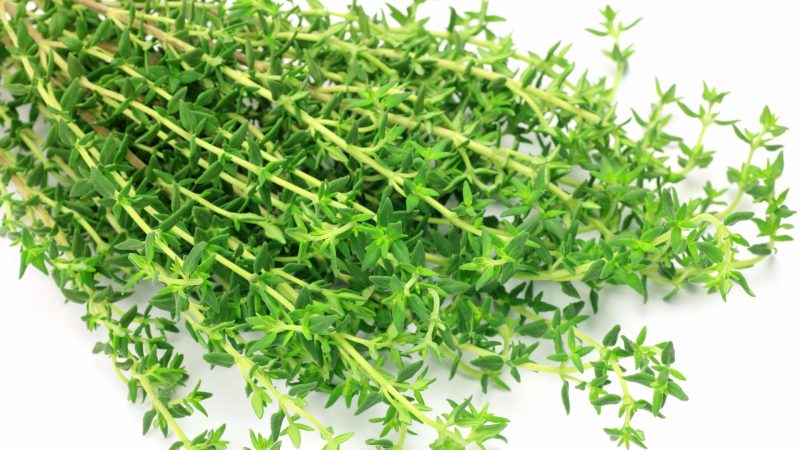
According to a study from Seoul University, thyme is one of the most effective botanical oils for the repelling of mosquitoes.
Another study from Ontario reported that crushed lemon thyme leaves have 62% of the repellency of DEET, making it a powerful bug fighter.
Thyme is also a creeping plant. That means that it will grow vibrantly in almost any environmental condition, making it an excellent, pest-repelling indoor container plant or ground cover for outdoor spaces.
6. Lavender
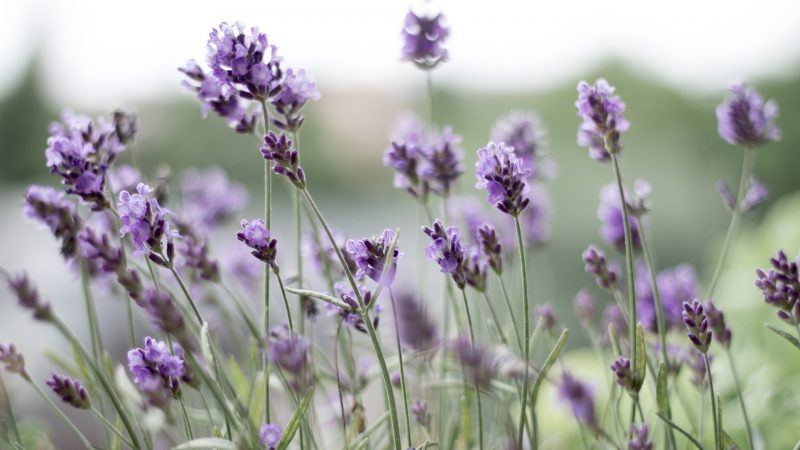
Most people love the sweet-smelling purple flowers of lavender, but mosquitoes and flies sure don’t! Lavender is highly fragrant, so you don’t even have to crush it to see the bug-repelling benefits of this lovely multipurpose plant.
Stick a pot of lavender by your windows or near your doors, and you probably won’t see many mosquitoes in your home again. To boost the power of lavender, you can hang sprigs in all of your windows or put a bag in your clothing drawers to make your clothes bug-repellent.
If you want to keep mosquitoes off your skin, you can even stick a dry sprig of lavender in your hand soap.
7. Basil

Many gardeners plant basil near other plants to keep pests away, and that includes mosquitoes. Basil has a pungent smell that many insects dislike. So, crushing a leaf or two and rubbing it on your window sills or door stoops can ward off mosquitoes and many other insects.
Basil is also one of the most versatile cooking herbs, so keeping it near your windows as a pest control measure is sure to serve many purposes.
8. Mint
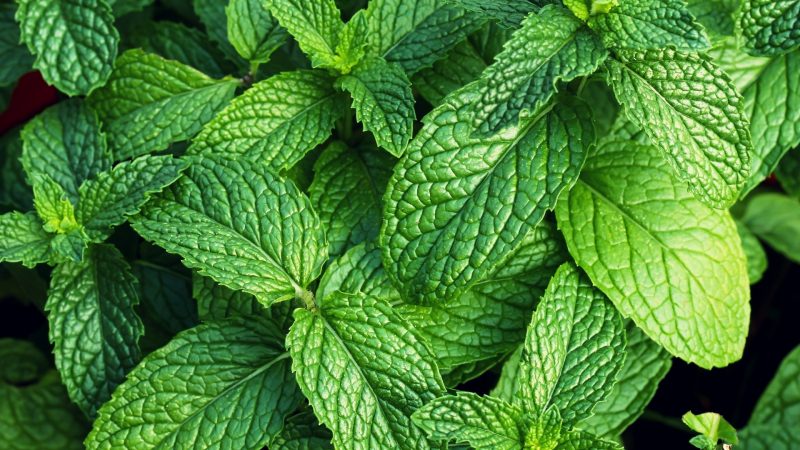
Mints such as peppermint, spearmint, and common mint are both excellent bug repellents and insecticides. Most natural bug repellents include mint, which works across a broad spectrum of pests.
Mint grows voraciously, and it rapidly spreads when planted outdoors, so it should not be hard to get plenty of mint from one potted indoor plant. Put a mint plant near windows, leave sprigs laying around your house, or soak it in ethanol to make bug spray.
You can also use mint in soap, incense, or alcohol as a bug spray, aside from its many culinary uses.
9. Catnip
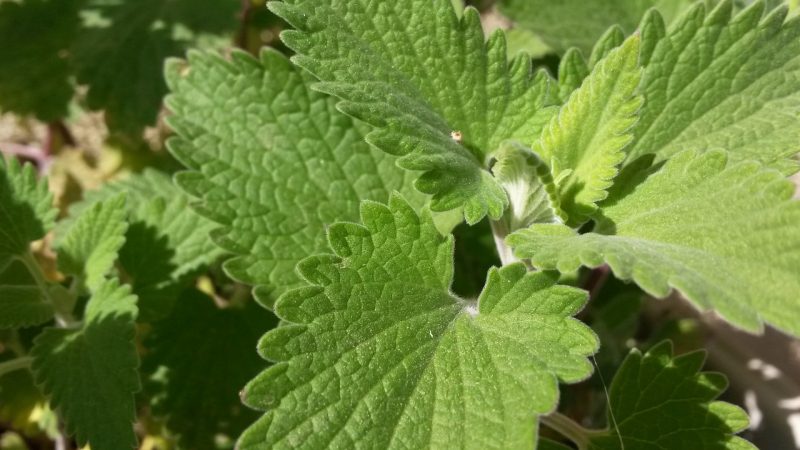
Catnip has a minty, pungent odor that attracts cats and repels mosquitoes. It repels mosquitoes very effectively, so put it near windows and doors to keep mosquitoes from coming in.
Like the other plants on this list, crushing catnip and using its oil to repel insects works best, so rub it on clothes, windowsills, and doors for the best results.
10. Floss Flower
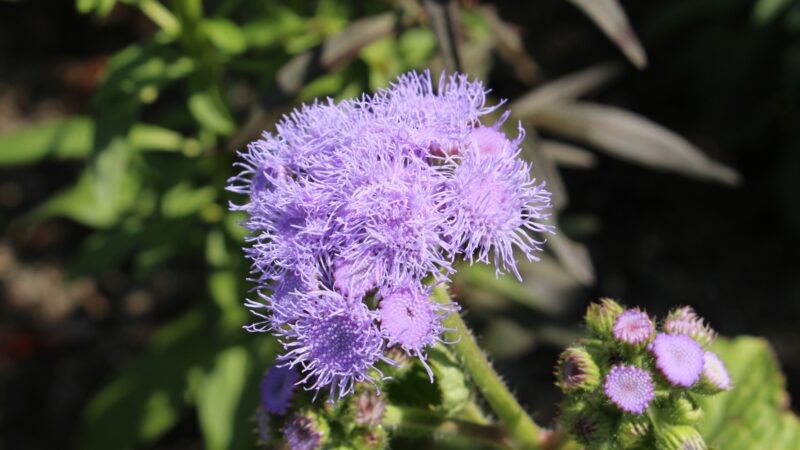
Although they aren’t the most effective deterrent, these purple beauties (Floss flowers) provide a scent that repels insects. The chemical coumarin, which is present in floss flowers and helps repel mosquitoes, also renders it poisonous if consumed by people or animals.
Ageratum, the scientific name of the Floss flower, can be planted in pots on your deck or around a patio to help deter mosquitoes. However, as the plant is poisonous due to the same chemical, you should exercise caution if your pets enjoy chewing on plants.
11. Allium
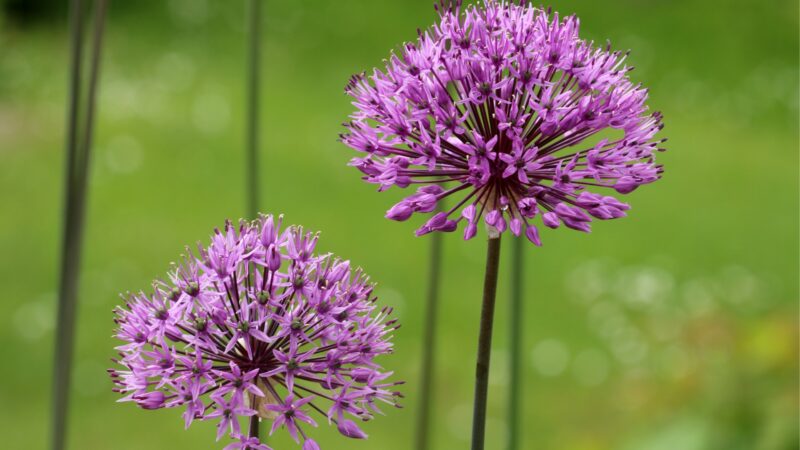
Allium, commonly referred to as attractive onions, are perennial bulbs. This has an aroma resembling that of chives, garlic, and onions, which are also plants in the same family. Allium plants’ distinctive, globe-shaped flower clusters provide an exotic charm while also deterring mosquitoes and other pests.
However, these plants have a low level of toxicity, so if you have pets who enjoy chewing on plants. A select few plants, including allium, deter mosquitoes just by being present in the garden.
12. Lantana
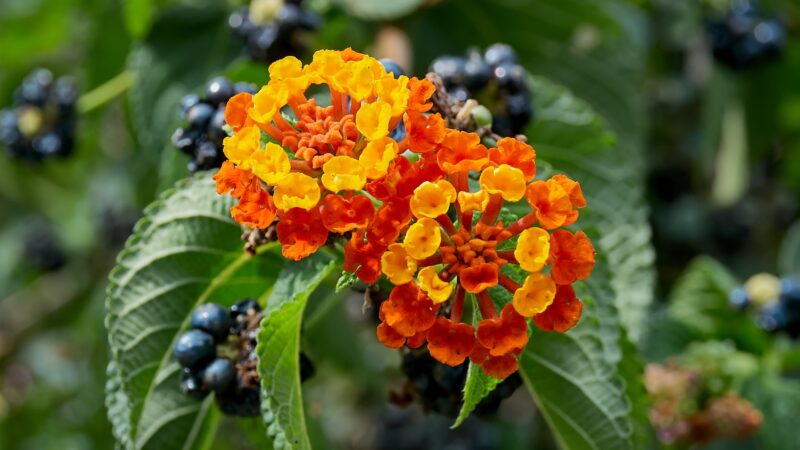
The blossoms of Lantana are so effective at repelling mosquitoes. The Journal of the American Mosquito Control Association reports that Lantana flower extract is effective in repelling Aedes mosquitoes in outdoor settings. Against Aedes mosquitoes, the extract provided 94.5% protection.
According to this research, this Lantana extract gave people an average of two hours of mosquito protection. What a benefit that lantana flowers are so simple to grow in hot, sunny climates and also draw butterflies.
Indoor Plants To Avoid When Dealing With Mosquitoes
Some plants offer shelter, food, and breeding grounds to mosquitoes, which could encourage them to invade your indoor spaces. These include:
- Bamboo
- Papyrus Plant
- Flowers
Generally, it is best to avoid these plants. However, suppose you cannot leave them outside. In that case, you may want to keep one of the pest-repelling plants mentioned above growing next to your mosquito-attracting ones.
1. Bamboo

Bamboo may be one of the easiest plants to grow since you can hardly ever overwater it. Still, since bamboo is most often grown in a pot filled with only rocks and water, mosquitoes will likely lay eggs in your bamboo pot.
Female mosquitoes only lay their eggs in pools of water, so keeping bamboo in your home will encourage them to lay eggs in your indoor plants.
2. Papyrus Plant
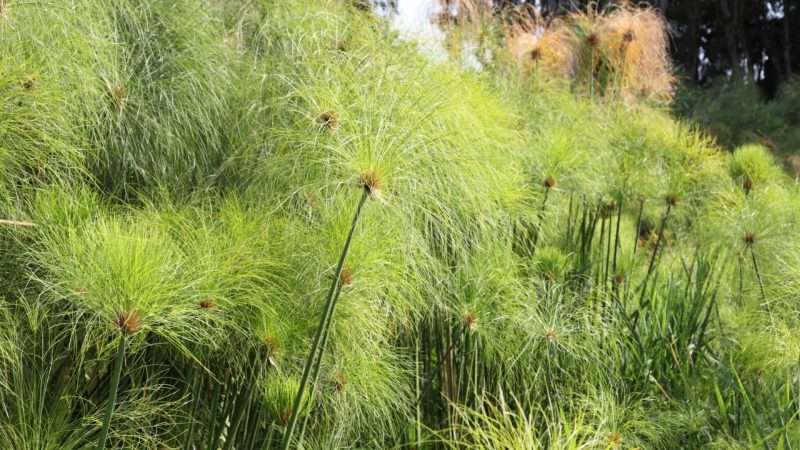
With their large, elegant leaves and unique appearance, papyrus plants are some of the most popular ornamental plants. However, they require marshy, soaking soil that may invite mosquitoes to breed in your home.
3. Flowers
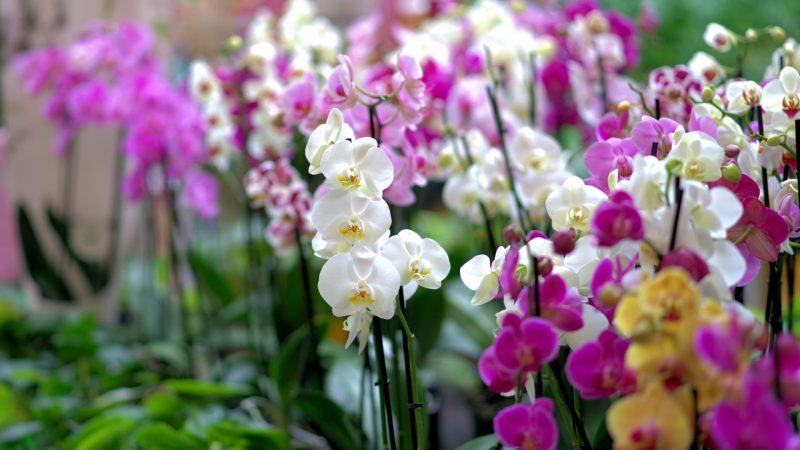
Mosquito pupae feed on pollen and nectar. That means that the flowers in your house may be giving immature mosquitoes the food they need to grow into full-fledged adults. Popular indoor flowers such as orchids, lilies, and violets, may invite mosquitoes to find new places to breed in your indoor spaces.
List of Sources
Pace, L. (2018). Can Fragrant Plants Help Repel Insects? Mississippi State University Extension.
Clark, K. (1993). Care of Mosquito Plants. North Dakota University.
Müller, G. C., et al. (2009). Efficacy of the Botanical Repellents Geraniol, linalool, and Citronella Against Mosquitoes. Journal of vector ecology: journal of the Society for Vector Ecology.
Potter, M. F., et al. (2003). Mosquitoes: Practical Advice for Homeowners. The University of Kentucky Entomology.
- How to Get Rid of Copperheads | Practical Guide - August 27, 2023
- How to Get Rid of Corn Snakes | What Makes Them Aggressive? - August 27, 2023
- How to Get Rid of Alligators | Safety Measures and Removal Methods - July 16, 2023
